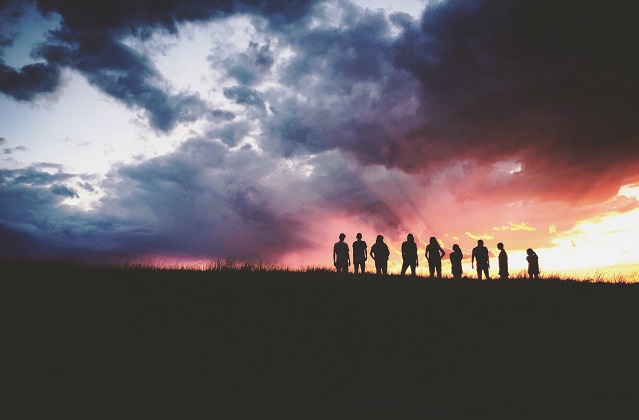What a difference a pronoun makes.
The promise of Jesus’ birth and Jesus’ name is, “God is with us,” not “God is with you.” That first-person plural pronoun establishes how God in the flesh chooses to be in the world. Not for our individual gain or theological guarantee. Not for our personal salvation. But to remind us of who we are meant to be and supposed to be—people in community, with God. People oriented toward the other because of God. People who truly believe God is present when even just two of us are gathered (Matthew 18:20).
On this last Sunday of Advent, I think we need this reminder, at least I know I do. Our human tendency is to turn in on the self; sometimes succumbing to the sin of selfishness, self-centeredness, and self-importance. Sometimes for escapism. But this is not supposed to be who we are.
“God with us” corrects “God is for me.” “God with us” corrects “God is for us.” “God with us” helps us remember that when we do turn away from others, we turn away from those who need us and those whom we need. We turn away from accountability and responsibility. We do this ostensibly so that we might avoid the darkness, even though we know perfectly well that the darkness isn’t going away—it will still be there when we surface from our hiding.
One of the most compelling reasons for self-absorption is self-protection, and justifiably so. Ironically, looking toward the promise of “God with us” is the very season that causes us to retreat. We recognize this about the Christmas season—how it exacerbates loneliness, pain, and grief. Perhaps you are seeing as many articles as I am on my Facebook feed regarding this fact about the holidays.
I know the feeling. Some of you are aware that I lost my mother the Sunday before Thanksgiving, and this is exactly what I am inclined to do—hide and decline spending time with others. I find comfort in my aloneness—or at least I think I will. But at the same time, I know I can’t stay there forever—out of necessity for my own well-being and because of the testimony I am called to give.
One of the most powerful articles I have read lately helped me see just how much we need “God with us.” The article suggests that we embrace Advent as that necessary ecclesial ritual of recognizing the “pain and wreckage” of the world. Yes, Christmas Eve is only two days after this Sunday, but perhaps we can hold on just a few more days to what Advent bids us to consider—that “God with us” never intended to take away our sorrow or brokenness.
Rather, “God with us” pulls us in to the shared pain that is our human existence and that “God with us” will now know intimately.
Tish Harrison Warren writes, “Our response to the wrongness of the world (and of ourselves) can often be an unhealthy escapism, and we can turn to the holidays as anesthesia from pain as much as anything else. We need collective space, as a society, to grieve—to look long and hard at what is cracked and fractured in our world and in our lives. Only then can celebration become deep, rich and resonant, not as a saccharine act of delusion but as a defiant act of hope.”1
“God with us” is the good news that even our escapism is not possible anymore. As much as we might want to individualize God or take a break from God, Emmanuel tells a different story. God simply will not leave us alone, neither to our own devices nor to avoid accountability to the other.
It seems that God really does know what is best for us, that being alone is dangerous to our own selves and to others. We need “us,” not only so that we know God’s solidarity as one promise of the incarnation but also to move us toward alleviating the pain of the other. We need “us” because being in community is not only our necessity but also our responsibility.
In other words, “God with us” is both promise and possibility; both presence and potential. “God with us” means that we are not alone. We are never alone. We are never apart from God and we are never apart from each other. But “God with us” also means that we look into the darkness together, honestly, as both “wounded by the evil in the world” and as “wielders of it, contributing our own moments of unkindness or impatience or selfishness.”2
The darkness is not going away, and perhaps that realization is what makes this season so difficult for so many. The coming of Christmas is its own miracle but cannot miraculously remove that for which there is no cure—which is why God became flesh in the first place.
The darkness continues. But together we sing, we light candles, we share meals, we give gifts, and we celebrate—all of which help us see the sign so easily overlooked when we are alone. The sign that is both our certain hope and the hope to which we defiantly witness: “The Lord himself will give you a sign. Look, the young woman is with child and shall bear a son, and shall name him Immanuel” (Isaiah 7:14).
Advent blessings,
Karoline
Notes
- Tish Harrison Warren, “Want the Get into the Christmas Spirit? Face the Darkness,” New York Times, Nov. 30, 2019. https://www.nytimes.com/2019/11/30/opinion/sunday/christmas-season-advent-celebration.html.
- Warren.

